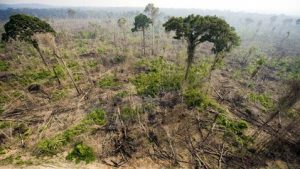The double-edged role forests play in stabilizing the climate and how
activism can help.
“Climate change is bigger than any one of us, and the solutions will be bigger
than any one of us as well.” – Anonymous
It always pays to begin any climate change discussion with the fact that the issue at hand is a complex problem that will require large numbers of people working at different levels for an extended period of time. These large numbers of people include non-governmental organizations, civil societies, private sectors, individuals, and government.
Fight Against Desert Encroachment (FADE) is one organization that has remained steadfast in its commitment to the prevention and control of environmental degradation with more emphasis on desert encroachment and desertification.
Trees as we will soon see play a crucial role in stabilizing the climate. A role that cannot be substituted or overlooked if any form of notable progress is to be recorded as we move forward towards the actualization of the Paris Agreement of limiting global warming to less than 2 degrees centigrade.
Deforestation, forest degradation, and land use change account for around 12% of all greenhouse gas emissions on the planet, so it’s clear that forests will play a critical role in helping countries meet their nationally determined contributions to fight climate change.
The thing is as climate change increases, our forests are seeing massive degradation and deforestation.  Rising temperatures make forests drier, more susceptible to fires, and vulnerable to pests and diseases. In a recent WWF Living Forest Report, failure to act now could destroy up to 170 million hectares of forest by 2030. What this means is not only the loss of biodiversity and livelihood affecting millions of species and people but also an increase in climate change.
Rising temperatures make forests drier, more susceptible to fires, and vulnerable to pests and diseases. In a recent WWF Living Forest Report, failure to act now could destroy up to 170 million hectares of forest by 2030. What this means is not only the loss of biodiversity and livelihood affecting millions of species and people but also an increase in climate change.
Climate scientists tell us that investing in forests and trees has the potential to reduce poverty, drive sustainable development and provide vital local and global environmental services that matter for our planet.
This is where activism comes in. Activism creates the necessary awareness and generates the needed pressure to get the attention and assurance of the wider public and policy makers in a bid to cause a change to happen. This change usually shows itself in legislative policies and executive actions that are
environmental and enforced. Hence, the reason those who are passionate about a clean environment are known to regularly demonstrate in different manners on the streets and off it.
With our work in Lagos and Abuja, FADE has organized and participated in peaceful demonstrations and night vigils to protest the cutting of trees on our highways. FADE was a front-runner in the campaign to stop the destruction of the Ekuri Community Forest in Cross Rivers State, and the list goes on. However, it is essential to reflect on how effective such activisms are if the awareness and
pressure doesn’t result in change.
Are we connecting to the public when we walk around in our customized t-shirts and banners with loud music? Are participants of rallies, walks and more, fully connected to the cause in question? It pays to reflect and when necessary, change our ways. What other tools can we employ as activists to get the word across?
Similarly, none of our solutions have to be perfect either. Every solution we come up with will have unintended negative consequences. If you go to a climate march, you may have to drive to get there, which creates greenhouse gases. If you want to connect with others doing the same kind of work, you may have to use a computer, which is made of rare earth metals and has built-in obsolescence. If you want to reduce your carbon footprint by installing energy- efficient CFL light bulbs, you may discover that they mercury in them, which has environmental costs associated with both extraction and disposal.
There is no perfect choice, no choice free of all negative consequences. But it’s important not to be paralyzed by this fact. We don’t have to be perfect. The best we can do is to try to educate ourselves about the consequences of our actions and make the most responsible choices we can be given a range of less than ideal options.